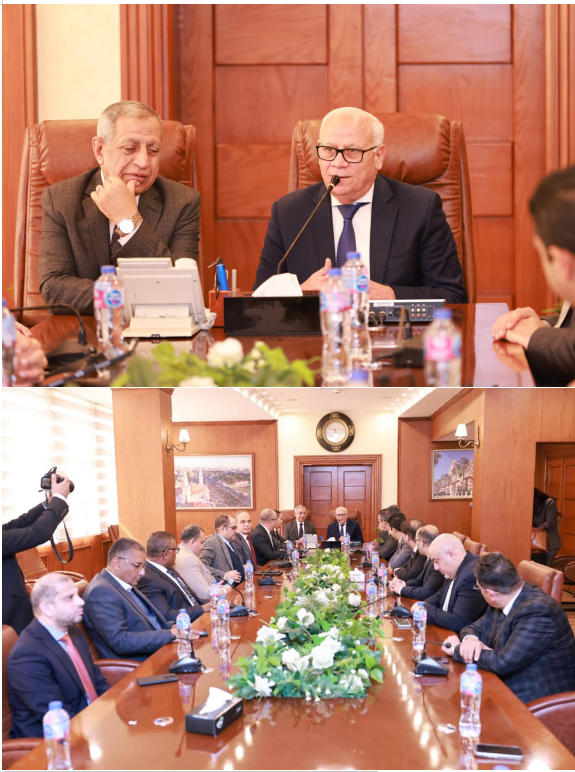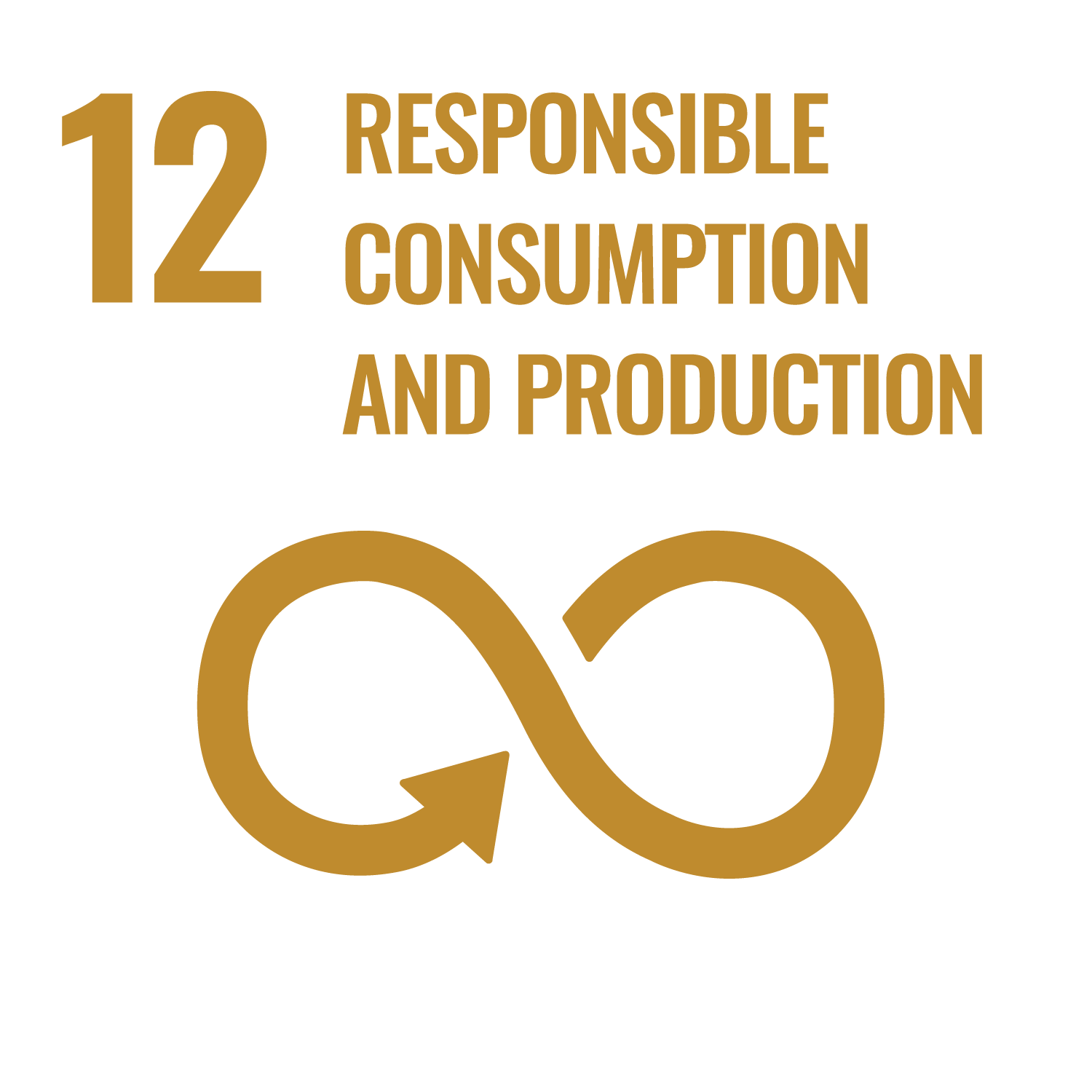 Goal 12. Responsible Consumption and Production
Goal 12. Responsible Consumption and Production
12.2.1 Ethical sourcing policy
2023-2024
AASTMT emphasizes its commitment to incorporating social and environmental responsibility into every facet of its business. The institution exemplifies robust environmental stewardship and acts as a model of responsible organizational conduct through the adoption of sustainable procurement procedures. This comprehensive strategy guarantees that sustainability is fundamentally embedded in AASTMT’s culture, fostering enduring advantages for the environment, society, and economy. The policy, entitled “Ethical Sourcing of Food and Supplies,” delineates the institution’s commitments and principles in accordance with the objectives specified in Policy Statement Point 5.
Consumption and Recycling Policy
1.Introduction
AASTMT recognizes the growing global challenges arising from the excessive pressure on natural resources, escalating greenhouse gas emissions, rising sea levels, pollution, and inefficient waste management. These environmental issues threaten both present and future generations, underscoring the urgent need for responsible consumption and effective recycling practices. In alignment with its Environmental Change and Social Responsibility Policy, AASTMT is committed to advancing the Sustainable Development Goals by promoting a culture of sustainability across all its campuses and operations. The Consumption and Recycling Policy reflects this commitment by emphasizing waste reduction, resource efficiency, and responsible material use.
Through this policy, AASTMT aims to minimize environmental impact by prioritizing waste prevention, reusing materials whenever possible, and ensuring proper recycling and disposal in compliance with environmental regulations. By fostering awareness and sustainable habits within its community, the University seeks to create a cleaner, safer, and more resilient environment for future generations.
2.Scope
This policy applies to all AASTMT employees, students, and contractors who are involved in handling, managing, or storing any form of waste, including hazardous and non-hazardous materials. It establishes the framework for ensuring that all waste management activities prioritize recycling, reuse, and responsible disposal in line with the university’s sustainability objectives.
Recycling must be integrated at every stage of the waste management process—beginning with proper segregation and collection, followed by safe processing and reuse wherever feasible. A designated responsible person or unit shall oversee the recycling and disposal of materials to ensure compliance with environmental standards and the adoption of the most sustainable methods available.
By embedding recycling practices into daily operations, this policy aims to minimize environmental impact, promote resource efficiency, and support AASTMT’s broader commitment to sustainable development and environmental stewardship.
3.Aims of the Policy
The AASTMT policy considers end-of-life disposal costs and environmental impacts when making acquisition decisions involving the construction of new or renovated facilities.
AASTMT receives the 'waste order' of Prevention, reuse, reusing, and other recuperation and removal. AASTMT executes cycles, methods, and activities that guarantee consistency with ecological enactment and best practice, to lessen the general waste produced and forestall waste creation at every possible opportunity. Moreover, AASTMT is committed to measuring and weighing the amount of waste generated to track the waste and to find the best methods to reduce or recycle it.
4.Procedures
The Waste Treatment Progressive System and Stages Incorporates:
Prevention
- Utilizing less material in the plan; keeping items for more; utilizing less unsafe material.
- Reduce landfill waste and boost the usage of reusable, biodegradable, and recyclable materials.
- Promote awareness and training programs to encourage responsible consumption and waste minimization across all departments.
RE-USE
- Getting ready for re-use; cleaning; fixing, restoring.
- Reduce the usage of single-use packaging. Reducing single-use packaging such as coffee cups and increasing the usage of reusable packaging
Recycle
- Transforming waste disposal into another substance or item, including fertilizing the soil.
- Anaerobic assimilation – transformation to biogas for power age; burning with energy recuperation.
- Establish accessible recycling stations across campus and ensure regular collection and monitoring of recyclable materials.
Disposal
- Reduce the disposal of items and send them by specialized to landfill to bury the hazardous materials.
- Tracking the disposal items through a third party which evaluates the amount and the cost of the disposal items.
- Ensure all disposal methods comply with environmental laws and safety standards to minimize ecological and health risks.
Ethical Sourcing of Food and Supplies
AASTMT is seeking to reduce food waste as much as we can through using food preservation methods and vermicomposting practices. The university is committed to delivering healthy food for all parties in the university including food on Campus, Residences, and employees whether vegetarian or others. AASTMT makes sure that the food is available at each level to guarantee healthy food for ASTMT’s stakeholders. However, food waste is still a problem for AASTMT. Therefore, AASTMT is applying the following procedures to use the waste of food in an appropriate way:
- Develop a monitoring system for food donations by using food waste.
- Most of the food waste produced is recorded and weighed to be sent to a device that produces bio-fertilizer for the green areas.
- Some of the waste of food is used to feed the animals like (dogs, and cats,
5.Policy Statement
The AASTMT seeks to implement ethical and sustainable practices on all of its campuses. Therefore, the AASTMT has taken crucial measures to implement these practices, such as ecological practices and corporate social responsibility. Through the exchange of information within the Academy's supply chain, these food ethics and practices enable AASTMT to ensure the transparency of information about all suppliers.
- Trusted suppliers
To accomplish supply chain transparency, one of the primary goals of AASTMT is to identify the most reliable and reputable partners who share the same ethical practices, objectives, and data. To accomplish ethical and sustainable practices, the first step is to identify the most suitable suppliers.
- Secure Relationships
The interaction with suppliers is the second step to keep secure relationships between partners and to reduce the risk. AASTMT is seeking to build a platform and application to increase communication and share important information. That would give the suppliers and partners access to the internal systems they need based on their roles within the ecosystem, sustainability practices, and the food ethics of AASTMT.
- Tracing the food supplies
Through utilizing new technologies such as block chain technology, AASTMT plays a crucial role in facilitating the monitoring and tracing of the origin of food. It allows the AASTMT to trace the origin of food and ensure its safe delivery to campuses.
- Evaluation of the process
AASTMT is monitoring the overall processes between its partners to guarantee healthy and sustainable food for students, staff, and Residents. Based on this monitoring, errors must be fixed, and corrective action must be taken.
AASTMT guarantees that we are conforming to guidelines, enactment, and best practices to limit the danger of prompt and future contamination or mischief to wellbeing when completing operational exercises.
6.Actions
- A proposition to build a Waste Management Centre throughout all AASTMT campuses to oversee every aspect of waste management within the Academy, and to recycle all type of materials generated.
- AASTMT is about to build a packaging lab, this lab is aiming to act as a hub providing packaging services consultancy for Egyptian and research on the field of packaging supply chain. The materials of this lab will be extracted from cartoon and plastic waste from the AASTMT campus to produce packaging prototype designs.
- AASTMT has halted the utilization of 'single use' plastics nearby utilizing a blend of elective materials and the suspension of deals of plastic filtered water nearby.
- AASTMT perceives the unfavorable effect of plastic waste, from creation through to removal. Plastic contamination can destructively affect the marine climate, and the College is looking to diminish plastic use and wastage nearby. The accompanying activities have been received to advance this point with staff and understudies:
- Single-use plastics in catering (food bundling, dispensable coffee cups, cutlery) have been supplanted with compostable catering supplies in all College food outlets, to lessen plastic waste nearby.
- AASTMT intends to keep on diminishing waste by investigating new items and administrations which will help with accomplishing decreased plastics utilization and waste.
- AASTMT will consider the hazardous materials that can be hurtful to the well-being or the climate. It incorporates irresistible organic/clinical waste, synthetics, solvents, pesticides, glaring light cylinders, refrigeration hardware containing ozone, non-eatable oils, batteries, asbestos, and paints. AASTMT will have an agreement with a third party to landfill these materials in a landfill area.
- The AASTMT will oversee, so far as is sensibly practicable, all dangerous waste exercises fall under its influence in a way, for example, to limit the mischief to human wellbeing or the climate.
- AASTMT will create and impart systems to empower workers to follow their “obligation of care” for the administration of risky wastes and screen these methods to guarantee consistency.
- AASTMT will launch awareness and training programs for students, staff, and contractors to enhance understanding of sustainable waste management, recycling processes, and the safe handling of hazardous materials.
- AASTMT will implement a digital waste tracking and reporting system to monitor waste generation, recycling rates, and disposal activities across all campuses, ensuring transparency, accountability, and continuous improvement in sustainability performance.
- AASTMT will integrate Artificial Intelligence (AI) technologies into its waste management systems to optimize waste sorting, monitor recycling efficiency, and predict waste generation patterns for smarter and more sustainable decision-making.
7.Objectives:
Waste ought to be forestalled or limited at every possible opportunity. AASTMT empowers staff, Students, and employers to limit plastic and cartoon waste, in addition to increasing the awareness about the method to minimize disposable items.
8.Review Program
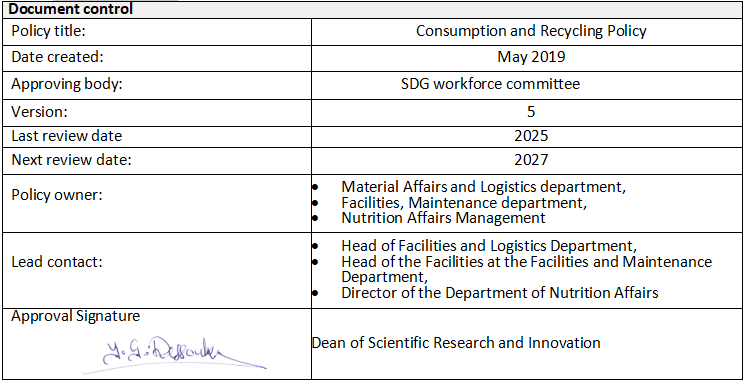
You can read our Consumption and Recycling Policy on AASTMT website.
More activities are applied and practiced in the AASTMT.
AASTMT Students Win National Recognition for Sustainable Project Turning Plastic Waste into 3D Printing Filaments
The AASTMT proudly announced the selection of a Mechanical Engineering graduation project from the College of Engineering and Technology – Alexandria Campus among 28 winning projects nationwide in the “Egypt Makes – Local Component Deepening Alliance” initiative, funded by the Academy of Scientific Research and Technology (ASRT) for the academic year 2023–2024.
The innovative project, titled “Recycling Plastic Waste into 3D Printing Filaments,” reflects AASTMT’s commitment to sustainability, circular economy practices, and achieving SDG 12 (Responsible Consumption and Production). The student team — Yousry Atef, Hassan Raafat, Omnia Yasser, Kerolos Raymond, and Karim Tarek — designed a system that transforms discarded plastic into reusable 3D printing materials, reducing waste and promoting environmentally conscious production.
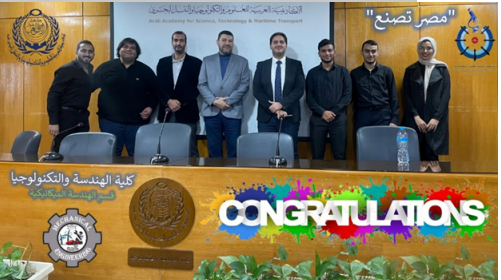
Official Announcement of Egypt MAkes page
AASTMT Partners in the Third Edition of the Egypt Industry Challenge 2023 to Foster Technological Innovation
The Arab Academy for Science, Technology and Maritime Transport (AASTMT) played a key role as a strategic and technical partner in the Third Edition of the Egypt Industry Challenge 2023, held under the sponsorship of the Academy of Scientific Research and Technology (ASRT). The challenge aimed to support university graduation projects and promote the application of Fourth Industrial Revolution technologies in Egypt’s industrial sector. In his remarks, Dr. Ismail Abdel Ghaffar, President of AASTMT, emphasized the Academy’s commitment to empowering young innovators and fostering collaboration between academia and industry to drive sustainable industrial development in line with Egypt’s Vision 2030. Through its partnership, AASTMT continues to promote innovation, applied research, and technology-based solutions that strengthen Egypt’s position in the global industrial landscape.
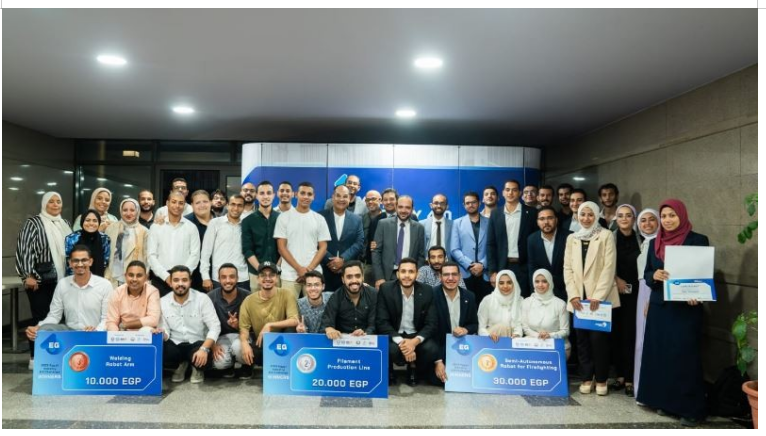
AASTMT Supports Egypt Industry Challenge 2023
AASTMT President Meets Port Said Governor to Expand Cooperation Opportunities
The Arab Academy for Science, Technology and Maritime Transport (AASTMT) President, Dr. Ismail Abdel Ghaffar, met with Major General Adel Al-Ghadban, Governor of Port Said, to discuss new avenues of collaboration in education, research, and development. During the meeting, both sides reviewed the progress of sustainable development projects across the governorate and explored joint initiatives between AASTMT’s Port Said Campus and local authorities to support industrial growth, innovation, and youth training. Dr. Abdel Ghaffar praised the governor’s efforts in implementing Egypt’s national development vision and reaffirmed AASTMT’s commitment to contributing to the advancement of Port Said through education, technology, and strategic partnerships.
